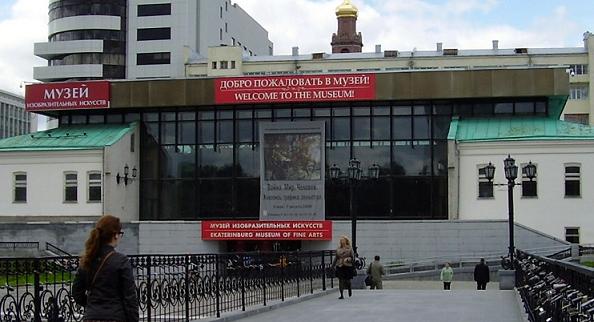Russian Cases: «Винительный падеж» [Accusative] (part I) Posted by josefina on Jul 13, 2009 in language
Today’s case – «винительный падеж» [accusative] – is used in the sentence above «Добро пожаловать в музей!» [‘Welcome to the museum!’] as an answer to the question: «куда?» [where?].
Today’s post will be an easy, breezy post – and thus a perfect post to read on lazy summer days like these in the middle of July. If you haven’t touched your «грамматика русского языка» [Grammar of Russian Language] since «день России» on the 12th of July – of which the ever increasing layer of dust upon it speaks clearly – «не переживай!» [don’t worry!] You are not alone, to use the famous words of the late great King of Pop, «Майкл Джексон» as the Russians call him. Summer is a time of the year when even the firmest of Russophiles is allowed to have other things on their mind than focusing endlessly on pronouncing unstressed «о» as «а» thus making words like «хорошо» [good], «облако» [cloud] and «небо» [sky] sound like «харашо» [good], «облака» [cloud] and «неба» [sky]. During the summer it’s okay just relax and spend some time with the easiest of Russian language’s six cases – «винительный падеж» [accusative]. This case is used after verbs to express the DIRECT OBJECT of the sentence – something that most other languages also have. Most sentences have a subject and a verb. The direct object is usually what follows that verb. That’s why this case should be a piece of cake for everyone, or, literally: «кусок пирога» – as this popular English idiom could have been directly translated into Russian but in general it isn’t because it is not an idiom in Russian. Anyway, let’s take a look at a couple of sentences where accusative expresses the direct object after verbs:
«Я вижу карту Республики Татарстан» – [I see a map of the Republic of Tatarstan].
«Каждый вечер мы смотрим телевизор» – [Every evening we watch TV].
«Он знает стихи Евтушенко» – [He knows Yevtushenko’s poems].
Accusative only gets tricky – and then only a bit tricky, not very very tricky, but a teeny tiny bit tricky – when it comes to the difference it makes between female and male nouns. Yes, you heard me: there’s a distinct difference between female and male nouns in accusative. The rule is as follows – in accusative the form for male nouns that are «ОДУШЕВЛЁННЫЕ» [ANIMATE; in other words: ‘living people’] is the same as in GENITIVE. Male animate nouns do not have a special accusative form. There’s no such difference between «одушевлённые» [animate] and «неодушевлённые» [inanimate] in accusative case for female nouns. They have their own special form in accusative – usually their «а»-ending is changed into an «у», the same thing happens to «я» which turns into a «ю». Here are some examples to illustrate this rule:
«Я знаю Ивана» – [I know Ivan].
«Ты помнишь Лизу?» – [Do you remember Liza?]
«Мы любим отца» – [We love (our) father].
«Они попросили Аню спеть» – [They asked Anya to sing].

Here’s an example of how female nouns ending with the vowel «я» receives the ending «ю» in accusative: «Берегите Россию!» [Protect Russia!]. The form «берегите» is plural imperative of the imperfect verb «беречь» [to save, keep; to save, conserve; to take care of; guard; protect]. In first person singular in present tense the form used is «берегу» as in «я всегда берегу природу» [I always protect nature], for example. After this verb the case used is always accusative.
It would be very easy to explain this case saying that the «винительный» [accusative] in this case comes from the verb «винить» [impfv. to blame]. But «Фасмер» and his «Этимологический словарь русского языка» [Etymologic Dictionary of Russian Language] teaches us that this is a folly and a mistake made long before us by people who – most likely – knew this language a whole lot better:
«Винительный падеж – калька с латинского слова casus accusativus, первноначально от греческого слова, что обозначало «падеж, обозначающий результат действия». В русском языке отражён неверный перевод с латинского: «винительный, то есть падеж обвинения».
[Accusative case – a loan translation from the Latin word casus accusatives, originally from the Greek word that meant “a case, meaning the result of an action”. In Russian is reflected the incorrect translation from Latin: “accusative, that is the case of accusation”.]
Next time we’ll take a closer look at the prepositions that demand to be followed by accusative case. And in the mean time – I wish everyone «счастливого лета» [a happy summer] and «хорошей погоды» [good weather] and, of course, «полезного отдыха» [healthy rest]! Anyone traveling to Russia this summer? Where to? I would love to find out!

Build vocabulary, practice pronunciation, and more with Transparent Language Online. Available anytime, anywhere, on any device.





Comments:
Ryan:
Hi Josefina,
I finished my first year of college-level Russian in June, and I’ve been reading your blog for a while now. It has been great to read for a break from the horrible monotony of a “modular” textbook. Keep going!
That said, you don’t give a rundown of plural, and funnily enough, I was never officially taught the accusative plural for animate objects, but I’ve come to the understanding that you use the genitive plural for masculine and feminine animate objects alike. Would I be correct in saying “я видел дедушек и бабушек” if I ever found the need to say that?
petr:
About one of your example sentences, “Я вижу карту Республики Татарстана”, you declined it as animate object. Why is that? Is Республика Татарстан animate?
Josefina:
Hi!
First, Ryan: yes, I kept it out of the post above because I want to write one big post about the whole Russian grammatical unti “одушевлённость” and write about what counts as having a ‘soul’ in Russian, and what doesn’t. Now, in your example, everything is right – and yes, the rule is the use the form for genitive plural also in accusative plural for animate objects – but here there’s another thing going on, too! “Дедушка” is a male animate noun, but has the ‘outer’ form of a female noun, so a better example sentence would be something like: “Я вижу мужей и жён” (don’t really know when someone will use that one, but hey – it’s the grammar that matters!).
Petr – of course Республика Татарстан is not an animate object (I put the word Tatarstan in genitive above, it shouldn’t be, I’ll fix it right now). Here we’re dealing with a case of the “карта чего?” [a map of what?]. And for female singular nouns there’s no difference in accusative between animate and inanimate. So “вижу карту” and “вижу Анну” it is!
Roberta Taussig:
I’m currently in St. Petersburg studying Russian and wandering the streets. I’ll spend a week in Moscow the first of August before going home. I want to thank you for your blog’s encouraging me to make this trip and to blog about it at “Roberta Goes to Russia” (www.rmtaussig.com/wordpress).
Moonyeen Albrecht:
Yes, I will be making my 18th trip to Russia from Aug. 17-Sept. 5. We are a small group, 7 people, and will go to Moscow, Perm, Tomsk, Omsk, Novosibirsk, Krasnoyarsk and Yeniseisk by planes, trains, automobiles and public busses.
Then, in Yeniseisk, we will board a boat and visit small villages along the Yenisei River, as well as the cities of Turukhansk, Igarka, Dudinka and finally Norilsk before returning to Moscow for the trip home. In 2001 I took a sailed on the Yenisei from Krasnoyarsk to Igarka with Project Aid Siberia. We delivered food and oil packages to people along the river. Also had a special helicopter trip to the indigenous Keto village of Farkovo. I have wanted to repeat the trip on the Yenisei ever since and now I have the opportunity thanks to the MIR Corporation travel company which has “off-the-beaten-track” trips to Russia and Asia.
If anyone is interested in doing this contact
mircorp.com. If you go to this web-site and look under the European section you can also read my 12 part blog (with photos) of my trip last year on the Volga River with the Russian National Orchestra.